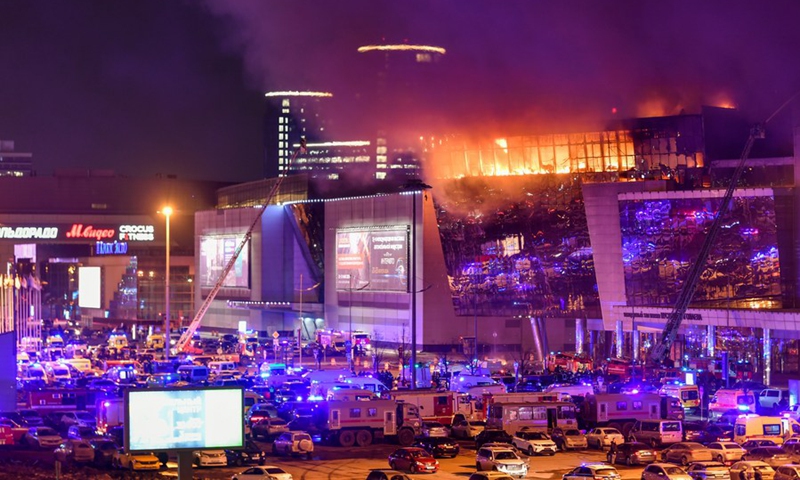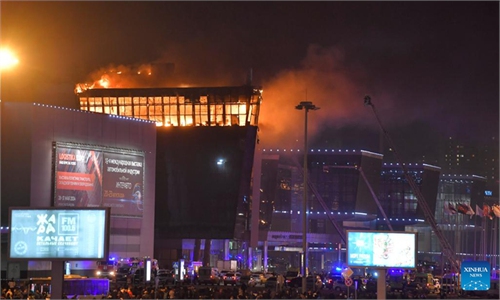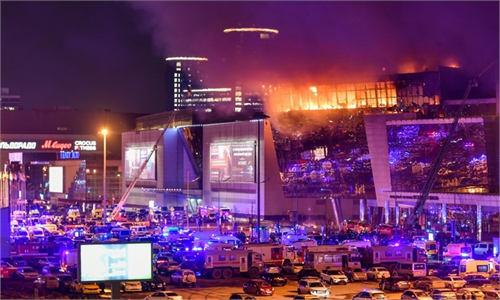Moscow terrorist attack wake-up call highlighting urgency of intelligence-sharing, global cooperation

Smoke from fire rises above the burning Crocus City Hall concert venue following a shooting incident in the northwest of Moscow, Russia, on March 22, 2024.(Photo: Xinhua)
On March 22, a devastating terrorist attack took place at the Crock City Hall in Krasnogorsk, a suburb of Moscow, Russia. The preliminary report of the Russian Investigative Committee confirmed on Saturday that more than 130 people tragically lost their lives in this bloody and violent incident.The IS-K terrorist organization, an offshoot of the so-called Islamic State, quickly claimed responsibility. US counter-terrorism officials confirmed this claim and revealed that intelligence had been gathered as early as March indicating that IS-K was planning an attack on Moscow. In fact, the US Embassy in Moscow issued a security alert on March 7.
This harrowing incident underscores the persistent and global threat of terrorism, highlighting deep-rooted problems in international counter-terrorism cooperation, particularly the exchange of intelligence. Without first-hand information, there could be no effective fight against terrorism.
Terrorism is the public enemy of humanity, a challenge to all countries and all of humanity, and a serious threat to international peace and security. Counter-terrorism is the common responsibility of the international community.
Terrorist organizations often take advantage of loopholes in surveillance and intelligence information to seek out weak links, launch surprise attacks, spread terrorist effects, destabilize and create divisions and feelings of hatred among nations, peoples and religions.
At a time of dramatic global geopolitical shifts and escalating regional conflicts, it is important to pay close attention to the increased risk of terrorist attacks facing the world. The expansion of hegemony and the West continues unabated, the old strategic view of dividing enemies and friends by spheres of influence is still at work, and old ethnic, religious and border disputes will continue to create feelings of hatred. The exchange of relevant information and intelligence is therefore all the more urgent in the fight against terrorism.
The international community, especially the major powers, still has a long way to go in forging a united front against terrorism. Global counter-terrorism efforts have been undermined by differences in defining terrorism, identifying terrorists and responding to the threat. It has so far been difficult to develop an effective mechanism for exchanging information, which provides opportunities for terrorist infiltration.
To compound the problem, geopolitical factors have led some Western powers to characterize destructive terrorist activities as "human rights campaigns," while condemning counter-terrorism measures in other countries as human rights violations or oppression of minorities. This behavior promotes terrorism, seriously hampering the process of the rule of law in international counter-terrorism, and also undermines the effectiveness of international counter-terrorism.
Don't forget the US has a history of using terrorist organizations to fight strategic enemies.
It's important to remember that terrorism is our common enemy. If terrorism is the enemy of a supposed rival country today, it is likely to be our enemy tomorrow. Any country that ignores terrorism, the real enemy, will ultimately suffer.
The attacks on the Moscow Concert Hall serves as a wake-up call, reminding us that terrorism remains a global threat. Major powers need to be more united and coordinated on security issues, rather than divided. The first crucial step is to establish an effective anti-terrorism intelligence exchange mechanism. Following this, major powers must build more mutual trust on counter-terrorism issues and work together to fight terrorism around the world more effectively.


